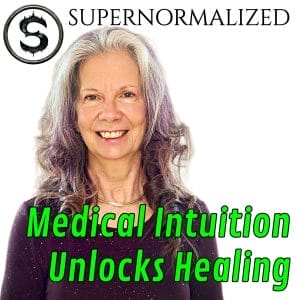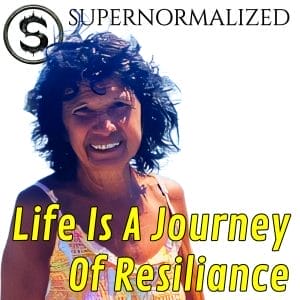In today’s digital age, it’s easy to feel overwhelmed by the constant barrage of notifications, social media scrolling, and the urge to constantly check our devices. CeeJay Barnaby, the host of the Supernormalized podcast, understands this struggle all too well. In this insightful interview, he shares his personal journey and the practical steps he’s taken to reclaim his mind and achieve digital wellness.
Barnaby explains that the average person spends over 6 hours a day on digital devices, likening it to having a part-time job just staring at a screen. He’s been there himself, describing a week where he was completely glued to his computer and phone, constantly checking emails and doom-scrolling social media. By the end of the week, he felt completely drained, with his focus shot.
The problem, Barnaby explains, is that our digital devices trigger a cortisol response, elevating stress levels and impacting our cognitive function. Engaging with negative or emotional content online can leave a lasting negative imprint on our minds and bodies. Additionally, the dopamine loop created by social media notifications and likes can lead to a digital addiction, where our brains crave that constant stimulation.
Barnaby emphasizes that digital hygiene is not about rejecting technology, but rather using it consciously and intentionally. He shares practical tips, such as setting screen time limits, scheduling digital-free time, prioritizing face-to-face interactions, and practicing mindfulness when using devices. By taking control of our digital lives, we can reduce stress, enhance memory, improve sleep, and strengthen our relationships.
The Supernormalized podcast is all about finding balance and increasing the benefits of living a fulfilling life. Ceejay’s insights on digital wellness are a crucial part of this journey, empowering listeners to take back control and thrive in the digital age.
Transcript
00:00:01 Do you feel like you’re always living your life through a screen? Constantly bombarded with notifications, scrolling endlessly through social media, feeling that nagging urge to check your phone every few minutes. You’re not alone. Millions of us are struggling with to find balance in the digital age. But what if I told you there’s a way to reclaim your mind, boost your focus, and actually feel good after putting your phone down? Here on Supernormalized today, we’re diving deep into the science of digital hygiene and giving
00:00:32 you the practical steps to take control of your tech instead of letting it control you. Stay tuned to the end for a full understanding of this and how to get around it. The average person spends over 6 hours a day on digital devices. That’s like having a part-time job just staring at a screen. I’ll be honest, I’ve been there. There was a week last month where I completely glued myself to the PC and phone, working into the dark hours, constantly checking emails and doom scrolling social media as a relief from
00:01:04 that before bed. We’ve all been there, haven’t we? By the end of the week, you feel completely drained. Your focus is shot. It was a wakeup call. Constant connectivity comes at a cost. Studies show excessive screen time is linked to decreased sleep quality, increased stress, reduced attention spans, and even impacts your cognitive function. It’s affecting your mental and physical health in ways we’re only beginning to understand. So, think about it. How many times you’ve picked up your phone just
00:01:34 to check something quickly and then ended up losing an hour scrolling through Instagram or some other social media app. Here on Supernormal Eyes, we’re talking about the science behind them. Why this happens today. Our digital devices, especially when we’re engaging with stressful or emotional content, trigger a cortisol response. Cortisol is often referred to as the stress hormone, and it plays a crucial role in how we process emotional stimuli. Studies have shown that engaging with digital content,
00:02:03 especially negative news or social media drama, elevates cortisol levels. This increased cortisol actually enhances the encoding of emotional memories. Meaning those stressful digital interactions can leave a lasting negative imprint on our minds and bodies. Cortisol doesn’t just make us feel stressed. It actually changes how our brain functions. A study published in the journal Neurology found that people with consistently high cortisol levels have reduced brain volume and impaired memory. This
00:02:34 suggests that chronic digital stress could potentially impact our cognitive abilities long term. But it’s not just cortisol. Dopamine, the pleasure molecule, is also at play here. Digital content, especially things like social media notifications and likes, trigger dopamine release in our brains. This creates a dopamine loop where we consistently seek out digital stimuli to satisfy our cravings for pleasure and self validation. This is the same mechanism involved in substance addiction. Our brains become wired to
00:03:06 crave that constant digital stimulation leading to compulsive checking anxiety when we’re away from our devices and a reduced attention span for anything that isn’t providing that quick dopamine hit. It’s a recipe for digital addiction. Interestingly, it’s not just the dopamine release that hooks us, but the unpredictability of when we’ll get that next hit. This is known as variable ratio schedule in psychology. The same mechanism that makes gambling so addictive. Each time we check our phone, we’re essentially pulling a slot machine
00:03:38 lever, not knowing if we’ll get a reward or not. Our brains have a remarkable capacity for empathy. Thanks to specialized neurons called mirror neurons, these neurons activate both when we perform an action and when we observe an action someone else is performing. This extends our perception to violence and violent scenes and harm to other humans and or animals. Studies published in the journal Cerebral Cortex found that when people view violent scenes, their brains activate in a new way similar to if they were experiencing
00:04:13 the violence themselves. Think about that. This is particularly concerning in the digital age where violent content is often just a click away. The amygdala, our brain’s fear center, can’t always distinguish between real or perceived threats. This means that exposure to violent content online, can trigger a ve stress response in our bodies, elevating cortisol levels and potentially contributing to anxiety and trauma-like symptoms. Imagine just by watching a program on your favorite streaming platform that you are experiencing
00:04:46 firsthand nightly what it is like to see or experience being killed, raped, murdering someone, and all the worst aspects of humanity. Many programs feature this kind of content wrapped up in a kernel of revenge tale or psychological thriller which is just coded you over psychologically while creating a fresh trauma response for you to embody. When you are in a consistent dopamine addiction and cortisol binge, you are malleable to signaling that primes your core sense of belief. Imagine believing
00:05:21 what the nightly news, for example, explains and presents to everyone without knowing it too is agenda driven. Almost no one I know thinks that way or thinks of it as being real anymore. Furthermore, streaming platforms algorithms push more violent content as it is inherently addictive as they only stay in business by keeping people watching. In a world where we are almost numb without stimulus, many of us consume content unconsciously and then sell that fresh trauma experience to others like it’s a good idea to get in
00:05:52 on the newest representation of how ugly we can all be. If we were to believe the content on those platforms, then the misery, violence, and corruption of the world is so extremely vast that there’s no escape. Do you really want to live in a world like that? Rant finished. So, how do we break free from this digital dopamine loop? One powerful strategy is a digital and violence detox. Now, I’m not saying you need to go live in a cave for a month. Nothing like that. Even short periods of disconnection can have profound
00:06:23 benefits. I purposefully took a weekend off from all screens. And honestly, it was gamechanging. I felt more present. My creativity soared and I reconnected with my family in a way I hadn’t in a while. I even started reading books again. The long-term benefits of balanced digital habits are incredible. Reduce stress, enhanced memory, better sleep, stronger relationships, the list goes on. Are you ready to take the leap towards digital well-being? I challenge you to join me in a 7-day digital detox
00:06:51 challenge. Start with just 1 hour a day of screen free time. It could be during your lunch break, before bed, or even first thing in the morning. Here are some practical tips to help you manage your digital habits. First, set screen time limits. Most smartphones have built-in features to track and limit your your app usage. Use them. Set realistic goals and gradually reduce your screen time over time. Schedule digital free time. Block out specific times in your calendar for screenfree activities. Treat these appointments
00:07:23 like any other important meeting. Don’t cancel them. Make sure you prioritize face-to-face interactions. Make a conscious effort to connect with people in person. Have lunch with a friend, call your family, or simply strike up a conversation with someone in your neighborhood. Practice mindfulness. When you do use your devices, be mindful of your usage. Are you scrolling mindlessly or are you engaging with violent content intentionally? Take breaks to focus on your breath and be present in the moment. And you can switch off. Just
00:07:55 remember that. Switch off anytime. In today’s digital age, finding balance is more important than ever. Digital hygiene isn’t about rejecting technology. It’s about using it consciously and intentionally. It’s about taking control of your digital life so it doesn’t control you. Here on Supernormalize, we’re all about finding that balance and increasing the benefits of living. If you found this video helpful, please give it a thumbs up and like and subscribe to the Supernormalized channel for more tips on
00:08:25 living and balanced and fulfilling life. And don’t forget to hit that notification bell so you don’t miss out on any future videos. Let me know in the comments below what your biggest digital challenge is and what steps you’re taking to create a healthy digital habit for yourself. I’d love to hear from you. And if you’re listening on a podcast platform, please give us five stars and tell your friends. Thanks so much for watching and I’ll see you in the next episode. Bye for now.














